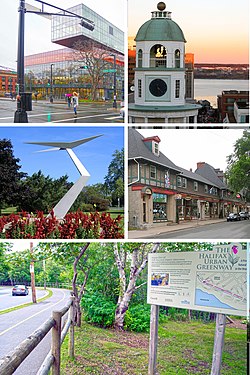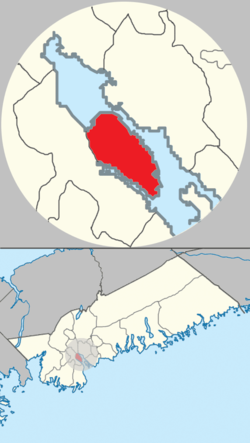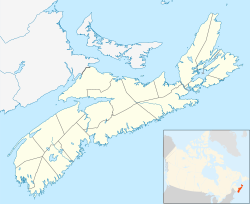The Halifax Peninsula is a peninsula within the urban area of the Municipality of Halifax, Nova Scotia.
Halifax Peninsula
Old Halifax | |
|---|---|
 From top right, pictures are Town Clock, Hydrostone Shops, HUGA Trail, Saunders Park, and the Halifax Central Library. | |
 Location of Halifax Peninsula in municipal Halifax. | |
| Coordinates: 44°38′52.0″N 63°34′27.4″W / 44.647778°N 63.574278°W | |
| Country | |
| Province | |
| Municipality | Halifax |
| Community | Halifax |
| Municipal Districts | District 7 (Halifax South Downtown), District 8 (Halifax Peninsula North), District 9 (Halifax West Armdale) |
| Founded | 1749 |
| Neighborhoods | Downtown, Hydrostone, North End, Quinpool, South End, Spring Garden, West End |
| Government | |
| • Type | Municipal Council |
| Area | |
| • Total | 18.949 km2 (7.316 sq mi) |
| Population | |
| • Total | 72,169 |
| • Density | 3,808/km2 (9,860/sq mi) |
| • Change 2016-2021 | |
| Time zone | UTC−4 (AST) |
| • Summer (DST) | UTC−3 (ADT) |
| Postal code span | B3H, B3J, B3K, B3L |
| Area code(s) | 782, 902 |
Part of a series about Places in Nova Scotia | |
History
editThe town of Halifax was founded by the British government under the direction of the Board of Trade and Plantations under the command of Governor Edward Cornwallis in 1749.[3] The founding of the town sparked Father Le Loutre's War. The original settlement was clustered in the southeastern part of the peninsula along The Narrows, between a series of forts (Fort Needham to the north, Fort George (Citadel Hill) in the middle, and Fort Massey to the south) and the harbour. With time, the settlement expanded beyond its walls and gradually encroached over the entire peninsula, creating residential neighbourhoods defined by the peninsula's geography.
From 1749 until 1841, Halifax was a town. After a protracted struggle between residents and the Executive Council, the town was incorporated into a city in 1841. From 1841 until 1969, the entire Peninsula was home to the former City of Halifax.
In 1789, the University of King's College was founded. Roughly thirteen years later, Saint Mary's University was founded in 1802. Subsequently, Dalhousie University was founded 1818. NSCAD University was founded in 1867.
In 1867, the Halifax Public Gardens and Victoria Park, Halifax were created, with many Victorian Era monuments. Builders such as George Lang created many landmark buildings.
During 1916–1919 a mega construction project was undertaken by Canadian Government Railways (later Canadian National Railway) along the peninsula's Northwest Arm shoreline which saw a 4 km (2.5 mi) long rock cut blasted up to 30 m (98 ft) deep for a railway line running from Fairview Cove to serve the new Halifax Ocean Terminals which were built at the southeastern end; the rock from blasting work in the cut being used as infill for a portion of The Narrows.
Rudyard Kipling paid homage to Halifax in his poem The Song of Cities:
Into the mist my guardian prows put forth,
Behind the mist my virgin ramparts lie,
The Warden of the Honour of the North,
Sleepless and veiled am I!
In 1969, adjacent rural areas within the former County of Halifax (that at this time were beginning to urbanize) west of the isthmus were annexed into the city. The city annexed Armdale, Clayton Park, Fairview, Rockingham and Spryfield.
On 1 April 1996, Halifax County was dissolved and all of its places (cities, suburbs, towns, and villages) were turned into communities of a single-tier municipality named Halifax Regional Municipality. Subsequently, the Halifax Peninsula was included in the new community of Halifax, within the new Municipality of Halifax.
Today, the Peninsula is the bustling region of the community of Halifax.
Geography
editProvincial electoral districts
editColloquial neighbourhoods
edit- Convoy Place
- Downtown
- Hydrostone
- Mulgrave Park
- North End
- Quinpool
- South End
- Spring Garden
- West End
- Westmount
Historic neighbourhoods
editStratigraphy
editThe bedrock of this peninsula is Precambrian slate. Glaciers during the Pleistocene era converted the rock surface to an olive-colored loamy till. Glaciation also removed reddish till from sedimentary rock to the north and redeposited it as a drumlin to form Citadel Hill. The stony loam to sandy loam soils are mapped as Bridgewater series on olive till and Wolfville series on the Citadel Hill drumlin.[4]
Topography
editAccording to the 2021 Census, the Halifax Peninsula covers approximately 1,894.9 hectares (18.949 km2).[5]
Peninsular Halifax extends from the western shore of Halifax Harbour, and is connected to the much larger Chebucto Peninsula by an isthmus measuring 2.6 km (1.6 mi), defined by Fairview Cove and the Bedford Basin to the north and the Northwest Arm to the southwest. Down the length of this isthmus is Joseph Howe Drive, generally considered to be the boundary between mainland Halifax and peninsular Halifax. The Halifax Peninsula creates The Narrows, a constriction of Halifax Harbour to its east.
The peninsula measures approximately 3.3 km (2.1 mi) at its widest and approximately 7.5 km (4.7 mi) at its longest, the peninsula's topography is relatively flat near the isthmus where Chebucto Field, an aerodrome that preceded Halifax Stanfield International Airport was located. The northern part of the peninsula rises to approximately 60 m (200 ft) above sea level as a glacial drumlin at Fort Needham, with the central area of the peninsula being a plateau roughly 40–50 m (130–160 ft). in elevation. Another drumlin approximately 60 m (200 ft) above sea level is located at Citadel Hill and immediately offshore to the east at Georges Island.
Parks and Recreation
editArenas
Art Galleries
- Art Gallery of Nova Scotia
Community Centres
- Children's Aid Society of Halifax
- Citadel Community Centre
- Community YMCA
- George Dixon Centre
- Halifax and Region Military Family Resource Centre
- Mi'kmaq Child Development Centre
- Mi'kmaq Native Friendship Centre
- Needham Pool and Recreation Centre
- Olympic Hall Community Centre
- Salvation Army Open Arms Centre
Libraries
- Anchor Archive Zine Library
- Halifax Central Library
- Halifax North Memorial Public Library
- Left-Leaning Library
- Library and Archives Canada Regional Service Centre
- Nova Scotia Barristers Library
- Vernon Street Community Library
Museums
- Africville Museum
- Canadian Museum of Immigration at Pier 21
- Maritime Museum of the Atlantic
- Naval Museum of Halifax
- Thomas McCulloch Museum
- Museum of Natural History
- Sea Turtle Centre
Parks
- Conrose Park
- Flinn Park
- Horseshoe Island Park
- Hydrostone Park
- Marlborough Woods Park
- Nick Meagher Community Park
- Fort Needham Memorial Park
- Larry O'Connell Park
- Peace and Friendship Park
- Point Pleasant Park
- Merv Sullivan Park
- Raymond Taavel Park
- Victoria Park
- Murray Warrington Park
Pools
- Centennial Pool
- Dalplex
- John W. Lindsay YMCA
- Needham Pool and Recreation Centre
- The Waegwoltic Club
Trails
- Africville Trails
- Point Pleasant Park
Demographics
editThe Peninsula's population grew to a high of 92,511 in 1961--and decreased thereafter. However, in recent years, the population has increased. In 2016, the population was 63,210 people. By 2021, the population increased to 72,169 people--an increase of 14.1% from 2016.
| Census Tract | Land area (km2) | Population (2021)[6] | Population (2016)[7] | Population Density (people per km2) (2021) | Population Change (%) |
|---|---|---|---|---|---|
| 2050003.00 | 2.365 | 2,885 | 2,955 | 1,219 | 2.4 |
| 2050004.01 | 0.481 | 4,045 | 3,466 | 8,402 | 16.7 |
| 2050004.02 | 0.482 | 5,466 | 4,771 | 11,340 | 14.6 |
| 2050005.00 | 0.769 | 1,813 | 1,808 | 2,358 | 0.3 |
| 2050006.00 | 1.054 | 3,553 | 3,129 | 3,371 | 13.6 |
| 2050007.00 | 1.16 | 1,947 | 1,859 | 1,677 | 4.7 |
| 2050008.00 | 0.504 | 5,203 | 2,778 | 10,325 | 87.3 |
| 2050009.00 | 0.635 | 2,875 | 2,357 | 4,528 | 22 |
| 2050010.00 | 0.834 | 6,019 | 5,036 | 7,213 | 19.5 |
| 2050011.00 | 0.808 | 6,013 | 5,631 | 7,446 | 6.8 |
| 2050012.00 | 0.518 | 2,901 | 2,482 | 5,598 | 16.9 |
| 2050013.00 | 0.805 | 2,630 | 2,561 | 3,267 | 2.7 |
| 2050018.00 | 1.397 | 3,758 | 3,544 | 2,690 | 6 |
| 2050019.00 | 0.891 | 5,126 | 5,062 | 5,755 | 1.3 |
| 2050020.00 | 0.999 | 3,602 | 2,562 | 3,607 | 40.6 |
| 2050021.00 | 0.877 | 3,544 | 3,314 | 4,041 | 6.9 |
| 2050022.00 | 2.833 | 5,581 | 5,301 | 1,969 | 5.3 |
| 2050023.00 | 1.537 | 5,208 | 4,594 | 3,388 | 13.4 |
| Peninsula | 18.949 | 72,169 | 63,210 | 3,808 | 14.1 |
Economy
editBeing a very populated area, the peninsula hosts many businesses, government services, hospitals, post-secondary institutions, and more.
Transportation
editRail
editThe Halifax Station is operated by Via Rail, and is the easternmost station for the Ocean. The Ocean travels from Halifax to Montreal once per week.
Road
editThere are many kilometres of avenues, lanes, roads, and streets that criss-cross throughout the Peninsula. The main thoroughfare is Robie Street. Robie Street runs approximately 4 km (2.5 mi), then continues on as Massachusetts Avenue.
Source:[8]
Halifax Transit provides many transit routes that traverse the peninsula. There are two terminals located within the area; the Scotia Square Terminal in the South End; and the Mumford Terminal in the West End.
Bus
edit Wheelchair – Uses Accessible Low Floor (ALF) buses only.
Rush Hour Service Only
Designated Bike Route
MetroLink Service
MetroX Service
| Route number | Route name | Features | Inner terminal | Outer terminal | Notes |
|---|---|---|---|---|---|
| 1 | Spring Garden | Mumford | Bridge | ||
| 2 | Fairview | Water Street | Lacewood | ||
| 3 | Crosstown | Mumford | Bridge; Highfield; Lacewood | ||
| 4 | Universities | Dalhousie University, Saint Mary's University | Lacewood | ||
| 5 | Portland | Scotia Square | Bridge; Penhorn; Portland Hills | ||
| 7 (7ᴀ/7ʙ) | Peninsula | Scotia Square | 7ᴀ runs in a clockwise direction, and 7ʙ runs in a counter-clockwise direction. | ||
| 8 | Sackville | Scotia Square | Bayers Road Centre; Cobequid; Sackville | ||
| 9 (9ᴀ/9ʙ) | Greystone (9ᴀ); Herring Cove (9ʙ) | Scotia Square | Mumford | ||
| 10 | Dalhousie | Scotia Square | Bridge; M District | ||
| 21 | Timberlea | Lacewood | |||
| 22 | Armdale | Mumford | |||
| 24 | Leiblin Park | Mumford | |||
| 25 | Governors Brook | Mumford | |||
| 26 | Springvale | Mumford | |||
| 28 | Bayers Lake | Mumford | Bayers Road; Lacewood | ||
| 29 | Barrington | Scotia Square; Water Street | Bayers Road; Mumford | ||
| 50 | Dockyard-Shipyard | Bridge | |||
| 84 | Glendale | Scotia Square | Cobequid; Sackville | ||
| 90 | Larry Uteck | Water Street | |||
| 91 | Hemlock Ravine | Mumford | Bayers Road Centre | ||
| 93 | Bedford Highway | Scotia Square | Cobequid | ||
| 123 | Timberlea Express | Scotia Square | |||
| 127 | Cowie Hill Express | Scotia Square | |||
| 135 | Flamingo Express | Scotia Square | Lacewood | ||
| 136 | Farnham Gate Express | Scotia Square | Lacewood | ||
| 137 | Clayton Park Express | Scotia Square | Lacewood | ||
| 138 | Parkland Express | Scotia Square | Lacewood | ||
| 158 | Woodlawn Express | Scotia Square | Alderney; Bridge; Penhorn; Portland Hills | ||
| 159 | Colby Express | Scotia Square | Alderney; Bridge; Penhorn; Portland Hills | ||
| 161 | North Preston Express | Scotia Square | Alderney; Bridge; Penhorn; Portland Hills | ||
| 165 | Caldwell Express | Scotia Square | Alderney; Bridge; Penhorn; Portland Hills | ||
| 168 (168ᴀ/168ʙ) | Cherry Brook Express: Auburn (168ᴀ); Cherry Brook (168ʙ) | Scotia Square | Alderney; Bridge; Penhorn; Portland Hills | 168ᴀ starts/ends on Hillsboro Drive near Barbara Drive. | |
| 183 | Springfield Express | Scotia Square | |||
| 185 | Millwood Express | Scotia Square | |||
| 186 | Beaver Bank Express | Scotia Square | |||
| 194 | West Bedford Express | Scotia Square | |||
| 196 | Basinview Express | Scotia Square | |||
| 330 | Tantallon Regional Express | ||||
| 370 | Porters Lake Regional Express | Scotia Square | Bridge | ||
| 415 | Purcells Cove | Mumford |
Ferry
editThere is a ferry service that runs from Downtown Halifax.[9] It is located at the Halifax Ferry Terminal in Downtown. It connects to either the Alderney Terminal in Downtown Dartmouth, or the Woodside Terminal in Woodside.
| Route number | Route name | Features | Inner terminal | Outer terminal | Notes |
|---|---|---|---|---|---|
| Alderney | Halifax | Alderney | The Alderney travels from the Halifax terminal in Downtown Halifax to the Alderney terminal in Downtown Dartmouth, and conversely. | ||
| Woodside | Halifax | Woodside | The Woodside travels from the Halifax terminal in Downtown Halifax to the Woodside terminal in Woodside, and conversely. |
Education
editThere are many colleges, private-and-public schools, and universities on the peninsula.
Colleges
- Academy of Learning Career College
- Apex Language and Career College
- Eastern College - Halifax Campus
- Nova Scotia College of Early Childhood Education
- Nova Scotia Community College Institute of Technology Campus
Inclusive Education
The Halifax School for the Blind is administered by the Atlantic Provinces Special Education Authority (APSEA).[10]
Private Schools
- Armbrae Academy
- Halifax Grammar School
- Halifax Independent School
- Maritime Muslim Academy
- Sacred Heart School of Halifax
- St. Thomas Acquinas Elementary School
- Shambhala School
Public Schools
All public schools on the peninsula are administered by the Halifax Regional Centre for Education.
- Citadel High School
- École St. Catherine's Elementary School
- Gorsebrook Junior High School
- Halifax Central Junior High School
- Highland Park Junior High School
- Inglis Street Elementary School
- Joseph Howe Elementary School
- LeMarchant-St. Thomas Elementary School
- St. Mary's Elementary School
- Sir Charles Tupper Elementary School
Universities
References
edit- ^ "Census 2021 Census Tracts". HRM Open Data. Government of the Municipality of Halifax. Retrieved 10 August 2022.
- ^ "Census 2021 Census Tracts". HRM Open Data. Government of the Municipality of Halifax. Retrieved 10 August 2022.
- ^ Beck, J. Murray (1979). "Cornwallis, Edward". In Halpenny, Francess G (ed.). Dictionary of Canadian Biography. Vol. IV (1771–1800) (online ed.). University of Toronto Press.
- ^ http://sis.agr.gc.ca/cansis/publications/surveys/ns/ns13b/%7CSoil[permanent dead link] Survey of Halifax County Nova Scotia
- ^ "Census 2021 Census Tracts". HRM Open Data. Government of the Municipality of Halifax. Retrieved 10 August 2022.
- ^ "Census 2021 Census Tracts". HRM Open Data. Government of the Municipality of Halifax. Retrieved 10 August 2022.
- ^ "Census 2016 Census Tracts". HRM Open Data. Government of the Municipality of Halifax. Retrieved 10 August 2022.
- ^ "Routes & Schedules". halifax.ca. Government of the Municipality of Halifax. Retrieved 10 August 2022.
- ^ "Routes & Schedules". Halifax. Government of the Municipality of Halifax. 14 March 2023. Retrieved 5 April 2023.
- ^ "Atlantic Provinces Special Education Authority". apsea.ca. Atlantic Provinces Special Education Authority. Retrieved 8 August 2022.
